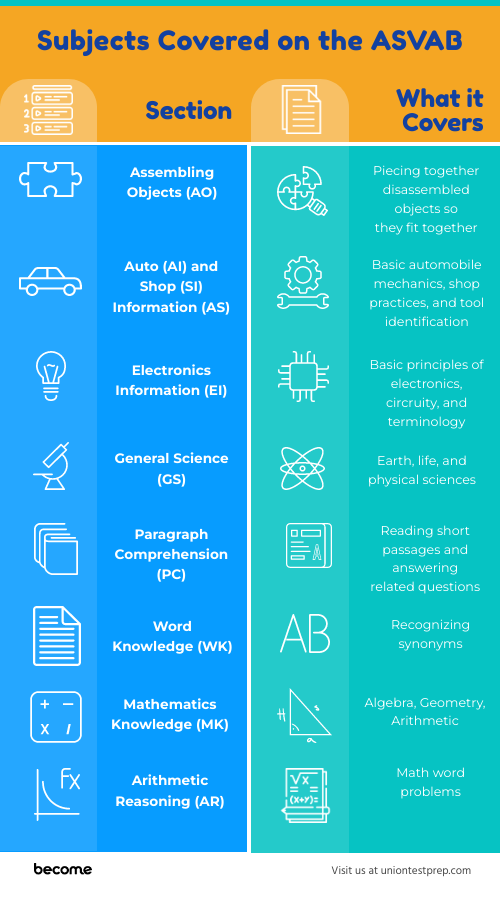
What Is an AFQT Score?
The U.S. maintains one of the world’s largest armed forces, with over 2 million active and reserve members. It also has the most powerful military out of any country, critical to peacekeeping, disaster recovery, and defense operations across the globe.
Do you want to join this preeminent service? The military relies on people who can meet certain mental and physical fitness requirements. Your AFQT score is one of the most important factors.
What is an AFQT score? Why is it so significant? Read on for all the information you need to complete this crucial step in enlistment.
What is an AFQT Score?
The Armed Forces Qualification Test is part of the Armed Services Vocational Aptitude Battery (ASVAB) exam. The ASVAB test is used for two purposes:
-
Enlistment eligibility (AFQT score)
-
Career placement (composite scores)
The AFQT score helps the military decide whether it will accept your enlistment. The other ASVAB scores are used to gauge which career(s) you qualify for within the military.
Although your AFQT and ASVAB career qualifications are separate scores, they are calculated from the same exam. Your AFQT score is based on certain section scores on the ASVAB test.
How is the AFQT Score Calculated?
There are 9 main sections to the ASVAB test. Each section measures your aptitude in a different skill area. These skills are:
-
General Science (GS)
-
Arithmetic Reasoning (AR)
-
Word Knowledge (WK)
-
Paragraph Comprehension (PC)
-
Mathematics Knowledge (MK)
-
Electronics Information (EI)
-
Auto and Shop Information (AS, sometimes separate as AI and SI)
-
Mechanical Comprehension (MC)
-
Assembling Objects (AO)

Every section has a set number of questions that will test your abilities and knowledge for that particular skill set. Unlike academic achievement tests, there is no penalty for wrong answers.
Your AFQT score is calculated based on how well you did in four sections:
-
Arithmetic Reasoning
-
Mathematics Knowledge
-
Paragraph Comprehension
-
Word Knowledge
This combination is then used to find your percentile rank. The military weighs your score against an average. This average is taken from a nationally representative sample of ASVAB scores.
If your AFQT score is a 70, for example, this doesn’t indicate you got 70 out of 100 questions correct. It means you scored at and above 70% of the military’s reference sample of test takers.
The highest AFQT score range is 93 to 99%. The lowest is 1 to 9%. While you can’t technically “fail” the ASVAB, a low AFQT score can be a barrier to enlistment. Passing the ASVAB means scoring at or above the minimum enlistment requirement.
Why is the AFQT Score Important?
To be eligible for enlistment, you must meet certain mental and physical criteria. The AFQT score helps determine your overall mental fitness for military service, although this is not the only factor.
You will have to meet certain requirements to take the ASVAB. If your AFQT score is below the minimum, you can be denied enlistment or have to go through a waiver process (if available). You may also retest after a certain waiting period.
It’s important to score as high as you can on your first ASVAB test, as it offers you more career choices and better enlistment chances. You may also miss out on available sign-up and career bonuses with a low score.
If you are enlisting without a high school diploma, your AFQT score is even more crucial to a successful enlistment. The military limits the number of recruits who can join with a GED or similar high school equivalent. Most also require a higher AFQT score minimum.
AFQT Scores by Armed Forces Branch
Every enlistee takes the same ASVAB exam regardless of their potential branch of service. However, the enlistment programs will differ between departments.
Each branch has different scoring requirements for enlistment. These scores change often depending on the military’s needs and quotas.
For instance, an Armed Forces branch struggling to bring in recruits may adjust both the composite and AFQT scores so more people qualify. Or they may increase scores due to over-manning. Always double-check the official website for the latest requirements.
Each department also has its own requirements for ASVAB waivers and retesting circumstances. The first retest is usually allowed after 30 days, and the second restest after six months.
Army
The Army’s current minimum AFQT scores are:
-
31 for enlistment
-
50 for enlistment bonuses
The Army currently does not maintain separate score requirements for high school graduates and GED holders, although this has been different in the past. Traditionally around 10% of its recruits are allowed to enlist without a high school diploma.
Air Force
The USAF’s current minimum AFQT scores are:
-
31 for high school graduates
-
50-65 for GED holders
The Air Force has higher requirements than the Army. According to their official site, GED holders must wait for a GED enlistment slot to open up before joining, which averages around one year.
Although their minimum AFQT score is 50, most GED holders will need a 65 to be enlistment eligible. Only around 1% of new recruits are GED holders.
This score threshold is also true for high school graduates. Their standard AFQT minimum is 31, but nearly three-fourths of all accepted recruits have an AFQT score of 50 or above.
Navy
The USN’s current minimum AFQT scores are:
-
31 for high school graduates
-
50 for GED holders
Like the USAF, the Navy typically has high requirements for enlistment. However, recent recruiting shortfalls opened up limited slots and waiver opportunities for recruits who don’t meet AFQT score minimums.
The current pilot program is set to last through the current fiscal year (October) 2023. High school graduates with a minimum score of 26 and GED holders with a minimum score of 31 may still be eligible for enlistment. This is still subject to availability and other factors.
Marine Corps
The USMC’s current minimum AFQT scores are:
-
31 for high school graduates
-
50 for GED holders
The Marine Corps also has limits on GED enlistments. Only around 5% of new recruits can enlist without a high school diploma.
Coast Guard
Although the Coast Guard falls under the Department of Homeland Security, its enlistment requirements are similar to the military. The USCG’s current minimum AFQT scores are:
-
40 for high school graduates
-
50 for GED holders
Like the USAF, the Coast Guard has very strict limits on who can enlist without a high school degree. According to their official site, GED enlistments are only accepted in “rare circumstances.”
National Guard
The National Guard is a reserve force for the Army and USAF. It’s jointly managed by state and federal requirements.
The National Guard’s current minimum AFQT scores are:
-
31 for high school graduates
-
50 for GED holders
The National Guard used to be much more supportive of enlistees without a traditional high school diploma. Unfortunately, their GED Plus Program ended in 2013. Any online information that still refers to this program is outdated.
AFQT Score vs. Composite Scores
The AFQT score uses four main sections. Each branch also has different scores they use for career qualifications. These are commonly referred to as composite scores, apart from the AFQT (which is also technically a composite score).
Each branch uses different career designations:
-
Army and Marine Corps: Military Occupational Specialty (MOS)
-
Air Force: Air Force Specialty Code (AFSC)
-
Navy: Navy Enlisted Classification (NEC)
-
Coast Guard: Rating system similar to Navy
They also refer to ASVAB composite scores by different terms:
-
Army and Marine Corps: Line scores
-
Air Force: Qualification area scores
-
Navy and Coast Guard: Subtest or rating scores
Composite scores are calculated by adding the applicable subtest scores together. These scores have their own minimums apart from the AFQT score.
To qualify as a Construction Electrician in the Navy, for example, your composite score will use your AR+MK+EI+GS scores as its formula. Your total score must be at least 201 to qualify.
How to Pass the ASVAB with High Scores
The best way to master the ASVAB is to study. There are many great study tools to help you learn the information efficiently and effectively.
ASVAB Study Guides
Study guides help you organize all the relevant information included on a test. They can also help you sort between subject areas you’ve already mastered, and areas that need extra study. Effective study guides will include skills and abilities you need, as well as the information you must learn.
ASVAB Flashcards
Online flashcards improve your test scores by sharpening your active memory recall. Instead of picking the answer from multiple choice, your brain must remember the answer on its own. This improves long-term memory retention.
ASVAB Practice Tests
Practice tests are one of the best ways to prepare for an exam. They measure your current performance and help you discover the best test-taking strategies. They also reduce test anxiety.
Mastering the ASVAB Is Just a Mouse Click Away
In addition to amazing job opportunities, the military offers many great benefits for healthcare, education, and retirement. You don’t want to miss out on the career of a lifetime because of a low AFQT score.
Are you still searching for premium study tools? Check out our ASVAB resource section, or create a free account today to start mastering your success!
Keep Reading

Armed Services Vocational Aptitude Battery Blog
What is the ASVAB Test?
The Armed Services Vocational Aptitude Battery, known as the ASVAB, is …

Armed Services Vocational Aptitude Battery Blog
Military MOS Codes
Military Occupational Specialty (MOS) codes are an integral part of the…

Armed Services Vocational Aptitude Battery Blog
U.S. Army Height and Weight Standards for Females
The U.S. Army’s commitment to maintaining a robust, physically fit, and…